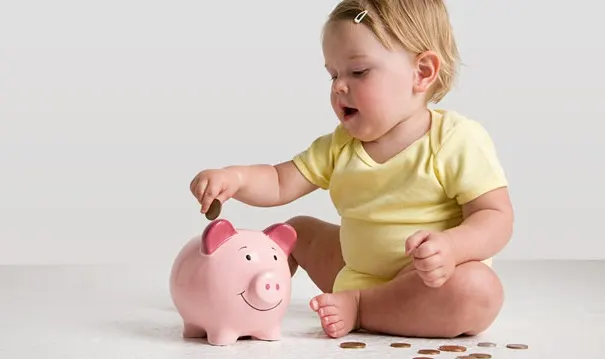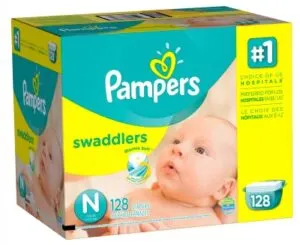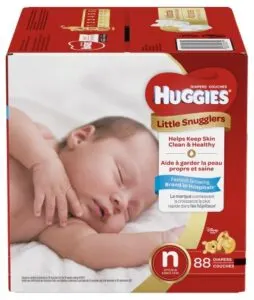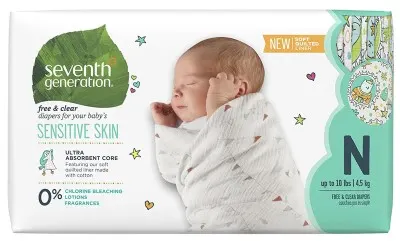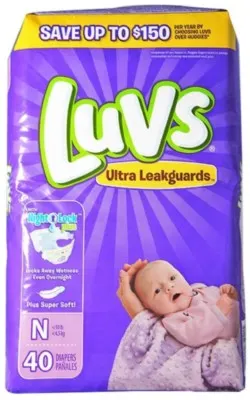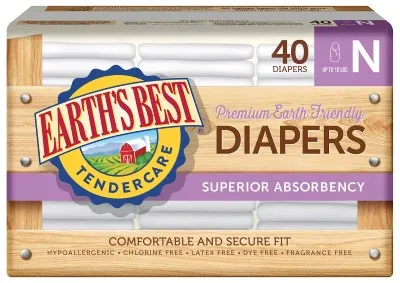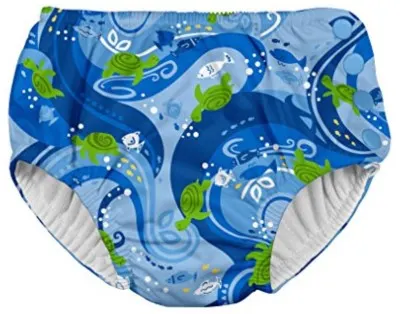For any baby and parents, the short (and not sweet) diaper life cycle is a big part of the daily routine for the first 1-3+ years. In the beginning (0-3 months), your newborn is probably going to go through about 8-12 diapers a day. This amount will taper off over time and obviously come to a halt upon successful potty training.
While some baby gear such as wipes are pretty straightforward and all just about the same, diapers have their own set of nuances and it can be wise to learn about them before committing to a certain brand. In this review feature, we check out some of the best diapers for newborns to help ease the stress.
What’s Here: Top Picks, Brands, Tips, and More
During the course of this page, you’ll learn about newborn diaper size and how to do a rough estimate of how many diapers you will need. You will also find a discussion about diaper economics and both sides of the cloth vs. disposable diaper debate. Then we share with our readers two of the most popular places to buy diapers online.
In our review section, up first, you’ll be able to peruse the top rated and best diapers for newborns of this year.
7 Best Diapers for Newborns
Welcome to our review section where we check out the top rated diapers of this year. Feel free to peruse this list, keep in mind you may want to experiment with a few brands before settling on the best diapers for your baby and you. If you see something you like, click for a detailed product information page.
1. Pampers Swaddlers
Best Disposable Diaper for Newborns with Sensitive Skin
Many hospitals use Pampers Swaddlers so this may be the very first diaper that pampers your newborn’s bottom. If your baby has sensitive skin and tends to get rashes easily, you may want to give these a go. They are built with a more snug and soft fit, with easy closures and wetness indicators to make changing time obvious. The liner also helps to wick away moisture from the skin and help prevent rashes.
2. BumGenius 4.0 Pocket Diaper
Best Newborn Cloth Diaper
Everyone who tries these cloth diapers wholeheartedly falls in love with them. bumGenius has a very clever snap design that is easy to learn. Even more, they have some adorable styles to choose from. If you’re looking for more great cloth diaper options for your baby, check out this cloth diaper shopping guide.
3. Huggies Newborn Diapers
Thickest Disposable Diaper for Newborns
The Huggies Little Snugglers newborn diapers is another very popular diaper. These are designed to fit newborns up to 10 pounds.
4. Seventh Generation Newborn Diapers
Softest Newborn Diaper
These are the first diapers made with pure unbleached cotton. This disposable diaper is made from 100% plant based material sourced from sustainably managed forests. Not only are they the softest of the best diapers for newborns, but they are also one of the most environmentally friendly options out there.
5. Luvs Newborn Diapers
Best Anti-Leak Newborn Diaper
The Luvs Ultra Leakguard diapers has a “leakguard core” tech that helps keep your baby dry. The leg gathers make for a snug fit and help prevent leaks. The great part about Luvs, is that they want to make sure that you and your baby love their product. If it doesn’t work for you, the company offers a full monetary refund.
6. Earth’s Best TenderCare
Best Eco-Friendly Newborn Diaper
This diaper is chlorine free, latex free, hypoallergenic, unscented, and alcohol free. They are made from natural materials such as wheat and corn which reduces the use of petro chemicals. On top of this they’ve got a comfortable and secure fit on your baby, with stretchy panels that help prevent leakage. They come in bulk sizes to help with value and getting the most for your money.
7. i play Ultimate Swim Diaper
Best Newborn Diaper For Swimming
The i play swimming diapers are water friendly diapers for babies of all sizes, including newborns. i play has these unisex swimming diapers, but also has some with super cute designs for boys and girls. They are machine washable, and more economical so that it can be reused.
Newborn Diaper Size vs. Standard Diaper Size
One area of confusion is the newborn diaper size. Which size is best to buy for your newborn or infant?

- For newborn babies, there is a special size called Newborn usually with the label “N”. Other diapers are labeled with a number for the size so it is pretty easy to distinguish the newborn diapers from the rest.
- If you have a really small baby less than about 6-7 pounds, you may want to start out with the Preemie size or “P”. Whatever the case, don’t buy too many of these newborn diapers because they will graduate to Size 1 in about 2-4 weeks.
- Don’t go too crazy with size 1 diapers either, in the first 3 months newborns grow exponentially, so buy conservatively. After this you’ve got sizes 2-6 in diapers and you probably won’t use sizes 5 or 6 unless you baby has a lot of junk in the trunk or you’ve been super lazy with their potty training.
Determining the Size
Probably the best way to determine what size they need is to go by your baby’s weight. For example, Size 1 diapers are designed for babies 8-10 pounds and up. So, if you have a bigger baby from the get go, you may want to skip “newborn” diapers altogether. Most diapers will the “newborn” label are for newborns up to 8-10 pounds. Many parents will keep their child in newborn diapers until about 3 months of age.
What Diaper Brand is Best?
You’ll get dozens of opinions from friends, family, hospital staff, nannies, and the internet about which brand is best for finding the best diapers for newborns, and which brand you shouldn’t touch with a ten foot pole. They’ll shout about Pampers this and Huggies that.
We think the most important thing to keep in mind is that no baby is made the same and each has their own unique little proportions.
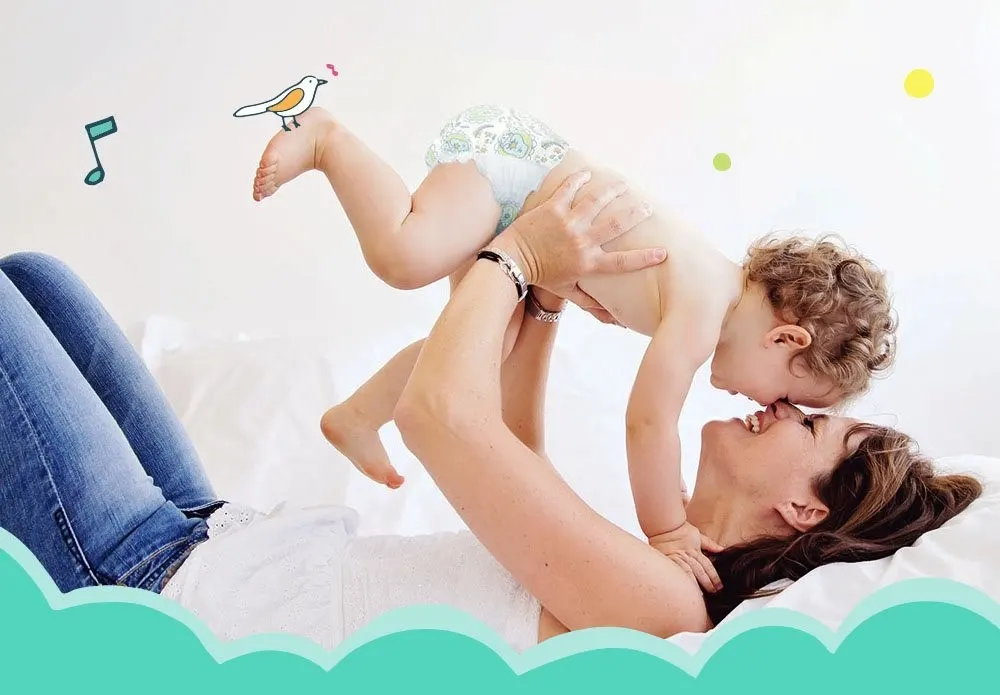
Some diapers may be a perfect fit for one baby and a terrible fit for another—even if both those babies weigh about the same. You’ll probably just want to experiment with a couple different brands and find which one works best for your baby.
The main things you want to avoid is severe rashes or constant leaking. Some babies have more sensitive skin than others so if you get unlucky in that department you’ll need to spend a bit more for sensitive skin diapers. Cloth Diapers, which are making a comeback in popularity and efficiency, do a much better job at preventing rashes.
General Tips for Getting the Right Size Diapers
- Find the right fit by experimenting with a few brands.
- Try this “HowManyDiapers” tool to estimate about how many you’ll need.
- Newborn Diapers are usually designed for newborns up to 8 pounds.
- Most parents use newborn type diapers until their newborn is around 3 months old.
- A 100 pack is going to be about 10-12 days worth.
- Wetness indicator lines can be helpful to monitor how often baby is.
- Cutout for the umbilical stump can also be helpful (~2 weeks for the stump to fall off). Otherwise fold backside down about 1-1/2 inch.

How Many Newborn Diapers do I Need?
Babies wear diapers morning, afternoon, and night so it is a good idea to find a type of diaper that is comfortable for them. As mentioned before, Newborn babies go through a lot of diapers, and could be even more if your baby is more “productive” if you get our drift.
How many newborn diapers will you need for one child?
It is estimated that on average, a baby will blow through about 4,000-6,000 diapers growing up. Some days you may find yourself shaking your fist at the almighty asking “Why!?” after changing your 15th diaper that day. Nevertheless, nature must take its course and there’s no way around it.
Diaper Economics 101
Time to get down to business then. We’re talking about diaper economics here people.
If you are buying middle of the road standard diapers, you’re looking at spending about $40/month on diapers for your baby. During the first 6 months, that will probably be closer to about $50 to $60.
Infants just go through more diapers. When you’re looking for the best diapers for newborns, cost will always be a factor.
This number will change dramatically depending on the type of diaper and brand. If you go all out and getting the fanciest most plush diapers that number goes sky high. Quality disposable diapers can be worth the extra change especially if they fit your baby well. You may not want to get them now, but after blowouts or getting pooped on a few times you may decide to spend more on diapers. A snug fit will dramatically cut down on leaks.
Cloth vs. Disposable
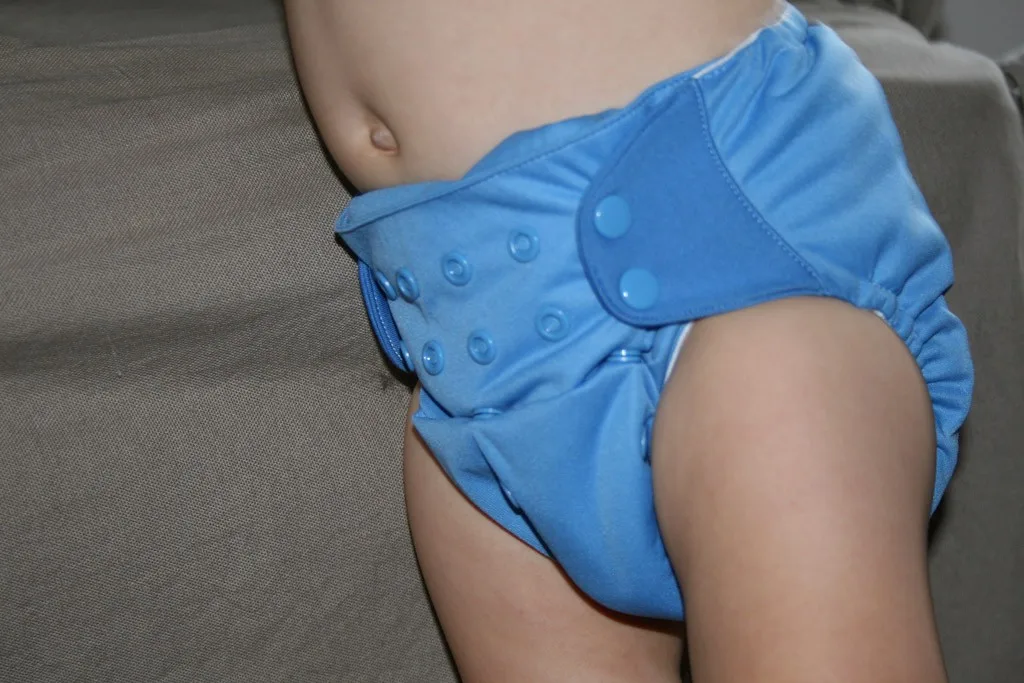
The absolute biggest impact on the total cost of diapers is whether you decide to use cloth or disposable diapers. Cloth diapers will save you A LOT of money on diapers over the “diaper years”. Especially if you are planning to have more than one child. If money is really tight, cloth diapers are the way to go, as you can often find quality used ones at a discounted rate. You may want to start with disposables for the first three months or so than switch to exclusively cloth.
However, you need to be real with yourself and determine what your “gusto” level is before committing to cloth diapers. Are you really up to cleaning all those diapers?
Pros of Cloth
You’ll save money and reduce waste by it being a more eco-friendly route (3.5 million tons of diapers end up in landfills each year). That’s a lot of dirty disposable diapers that are being tossed. Sure, if everyone used cloth diapers that would cut down a lot of landfill waste. In addition, the attraction with cloth diapers is you buy once—ideally in bulk—and then you’re done. But the work is far from over.
Other Factors
You’re going to need to create an efficient diaper washing routine to keep your baby clothed in clean diapers. That means a fully operational containment system to prevent your nursery and home from becoming a bio-hazardous zone.

Which brings to front another point, do you own a washer and dryer?
If not, the whole cloth diaper thing may be a wash in savings because pay per load machines suck down a lot of quarters. Instead of simply throwing away the mess, you need a diaper hamper that cuts down the odor and you’ll be doing many loads of nasty diaper laundry. And don’t forget to scoop the poop out of the diapers into the toilet before throwing them in the washing machine. If that doesn’t sound like something your up to than you may want to go the disposable route.
You can always look into local diaper services who will deliver cloth or compostable diapers to your house and pick up the old ones. It’ll cost you a pretty penny but at least you’re doing your part to save the earth (plus that’s a lot of time cleaning nasty diapers you just saved yourself).
More to Consider About Diapering
At first blush, cloth diapers may sound like the way to go and more parents are deciding to go that route. However, after your 10th load of poopy diaper laundry many parents change their tune. Just to give you an idea of how convenient disposable diapers are, there are still about 80% of parents using disposable diapers for their children. Only 1 in 5 parents are using cloth diapers still. We respect parents that follow through on the cloth diaper thing, but sometimes it just isn’t feasible due to time constraints.
As a side note, if you really want to reduce your baby’s footprint attempt to potty train them as early as possible. That alone will save you a lot of money and significantly reduce waste. Elimination communication (EC) is a potty training method that has been growing in popularity in Western countries and is worth trying. It is part of the “diaper free movement” and has been a method used in Eastern countries for centuries.
Check out this YouTube video to learn more about cloth diapering. The cloth diapering world is vast and if you know nothing about cloth diapers it may be overwhelming at first. You can spend up to $200-$300 on your first batch of cloth diapers so it is a good idea to find a brand you are confident in before making the plunge.
Benefits of Cloth Diapers:
- Reusable
- Save money
- Buy once in bulk
- Eco-Friendly
- Super Cute
Benefits of Disposable Diapers:
- Easy clean-up
- Save time
- Low “start-up” cost
- Better for changing “on-the-go”
Where is the Best Place to Buy Diapers?

There are a couple diaper programs you should be aware of. Our knee jerk reaction is to point you to Amazon Mom. When you first sign up, you get Amazon Prime free for three months ($99/year after that). One hundred dollars isn’t bad considering all the amazing goodies you get with a membership such as instant video, Prime photos, Prime music, Kindle Owners’ lender library, etc. Amazon Prime members will also save 20% on diaper subscriptions on top of the subscribe and save program.
That means you’ll recoup the $99 membership fee very quickly and then some. This is particularly big cost savings if you are going the disposable diaper route. Plus you’ll get another 10-20% off items such as wipes, household items, and other baby essentials. Amazon Prime means free 2 day shipping on all items, making this a great diaper program for working parents.
Diapers.com

If Amazon has failed to woo you, Diapers.com is another great place to buy diapers. They offer a free 1-2 day delivery on all orders above $49. You can sign up for an account and use their easy re-order feature. Diapers.com carries some of the brands you’d find at any top retailer. Plus, they carry a bunch of other baby gear if you take a liking to their website. Their customer service line 1-800-DIAPERS is available 24/7 if you have any questions about a product or one of your orders.
For store shoppers, you can try out Store brands. Target features up & up which performed well in comparison tests. Walmart has Parent’s Choice and Costco has Kirkland diaper, and Sam’s Choice has Members Mark. Most retailers will carry many of the brands we featured in our best diapers for newborns section.
